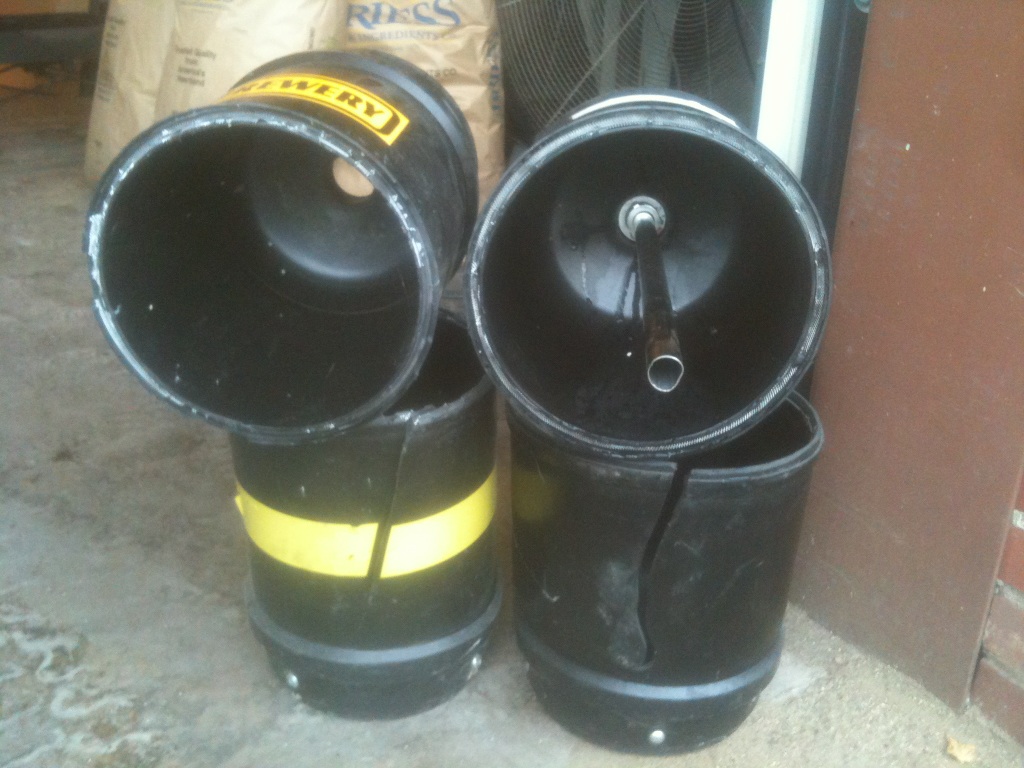
The recent explosion at Sam Adams and the one earlier this year at Redhook both involved plastic kegs (pictured above). In this link, there is a brief description of the potential issue from SaferProducts.gov:
Incident Description
During standard cleaning procedures, we had a plastic 1/6 bbl. keg manufactured by PKA, Plastic Kegs of America, explode at the seams. this has happened to us twice with individual kegs. We had our instrumentation inspected and it was functioning properly. Apparently there is an installed “safety disc” that will fail prior to the keg exploding as it did….the safety feature was never initiated. Fortunately no injuries were sustained. I have contacted PKA about this and they have been slow to respond. I know there are numerous accounts of this and one ended in death.We have discontinued use of this product and I have emailed my PKA rep to arrange a potential buy back for retesting. Email sent on 8.14.12, no response as of 2:25pm EST
Incident Date
5/18/2012
This issue seems to be a large problem that needs to be corrected quickly. At Ghost River Brewing they have installed the keg washers behind a plexiglass shield.
Ghost River created an enclosure around its pressurized keg washer, with a locking door. He said it was “just a recognition that what can go wrong typically will.”
In a message on Twitter, Ghost River employee Joey Vaughan gave a more detailed explanation. It was accompanied by a photo of a broken plastic keg.
“This is why I stand behind a 1/2-inch thick Lexan blast shield when filling plastic kegs,” Vaughan wrote. “Sometimes, they blow up.”
Vaughan, who now owns a craft beer retail store in Mississippi, told Foster’s he witnessed five plastic beer kegs rupture during his time as an employee at Ghost River, where he operated the keg washer.
Why are these kegs used in place of metal kegs?
Jim Holton, owner of Mount Pleasant Brewing Company in Michigan, said he’s been using plastic kegs for about five years, ranging from the original European models to newer kegs designed by PKA when it opened in California.
“It was a great option for a startup brewery because stainless steel costs have skyrocketed,” he said.
The brewery was also suffering from theft of its kegs by people hoping to sell them as scrap metal. Mount Pleasant lost about 100 stainless steel kegs to theft in three years, he said.
But this budget saving measure comes at a potentially high cost. You can click here for more info about the law firm that stepped up to help this company workers.
Holton said he contacted PKA after the explosion at Redhook, and was assured of the product’s safety.
Then on Aug. 6, one of the plastic kegs exploded while it was being cleaned on an automated machine, Holton said. One half of the keg soared upward, denting a 20-foot-high ceiling, and the bottom half slammed into the machine.
“If a brewer or a human being was standing over that keg when that happened, I see no reason why they would have survived that,” Holton said. “I think it would have been a catastrophic accident.”
After the accident, brewery workers inspected their equipment and discovered a pressure reducing valve wasn’t working properly. As a result, the pressure being pumped into the keg could have reached as high as 100 psi, the maximum rating for the air compressor feeding the machine.
Plastic Kegs America indicates on its website that the product is designed to operate at a maximum pressure of 60 psi.
Holton said the brewery has now installed a double pressure relief valve and other safety components to prevent another keg from blowing out.
“Our incident was luckily that we lose a keg,” he said. “We don’t lose a human life.”
It seems that Plastic Kegs America is trying to bury their head in the sand when it comes to dealing with this issue.
Foster’s Daily Democrat obtained a copy of an Aug. 15 email message sent by PKA Sales Manager Darcie Symons to the Brewers Association’s internal mailing list. The message indicates the company’s products have a maximum working pressure of 60 psi and that the kegs will rupture at a minimum of 90 psi.
“Based on the information Plastic Kegs America has to date, in all instances of purported failure, the kegs have either been pressurized above 90 psi or have been damaged after being manufactured and sold,” Symons wrote. “We take every report seriously and investigate all claims. Plastic Keg America extends its deepest sympathies with regard to the accident in New Hampshire.”
PKA founder Simon Wheaton declined to comment on the Redhook investigation when he was contacted earlier this month.
“I think we both realize the direction that you’re coming,” Wheaton said in a phone interview, “and I think on advice I have no comment to make at this time.”
Has industry perception of the plastic kegs changed since these incidents?
“The only bad thing about them is their sort of perception on the market,” he said.
However, that perception is starting to impact the brewery’s bottom line. Hermannsson said contractors who brew the company’s beer have stopped filling and cleaning plastic kegs. The brewery was also required to use stainless steel kegs at The Great American Beer Festival in Denver earlier this month. The Brewers Association, which sponsors the annual event, did not allow plastic kegs this year.
Jeremy Pate, an Alabama brewery industry consultant, said he’s been contacted by at least one client since the death at Redhook who was seeking advice about whether to use plastic kegs.
“I said, ‘Well, basically, I’m not afraid of plastic kegs,’” he remembered. “I understand, basically, how they’re constructed. I understand that when manually washing kegs, I would have all of my safety regulators presets well below the safety standards of those kegs. If you have plastic kegs, you cannot run and treat them like stainless steel kegs.”
For me, I understand that there is a cost savings in using these kegs, but if there aren’t better safety measures in place to protect those around the kegs, maybe the savings just aren’t worth the risk.
Source: http://www.fosters.com/




Follow Us!